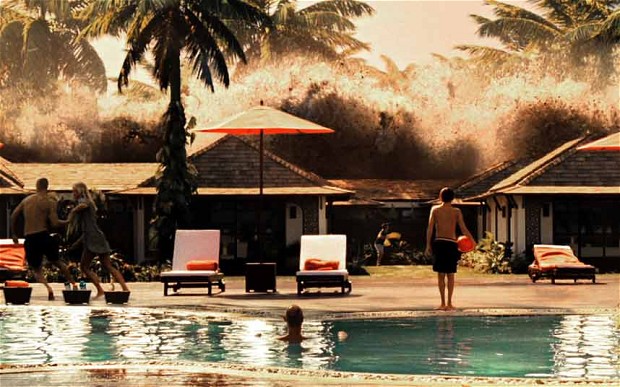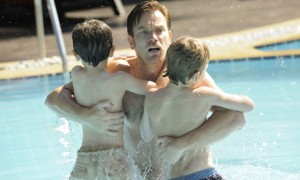You have no items in your cart. Want to get some nice things?
Go shopping
Basing a film on real-life events always leaves it open to charges of inaccuracy, insensitivity and imbalance, especially when that event is the 2004 tsunami that killed hundreds of thousands of people in Southeast Asia. The Impossible, directed by Juan Antonio Bayona, is based on the true story of a Spanish family holidaying in Thailand at the time, and certainly seems to have opened itself up to controversy with its narrow focus and apparent lack of interest in the wider picture.
The film opens by informing its audience that everything we are about to see is based on a true story. Gradually, all the words on the screen fade, leaving only “true story”. This bold, almost embarrassing underlining of the facts is symptomatic of the picture’s approach to the disaster as a whole. The Spanish family has been transformed into an English couple — Maria and Henry (Naomi Watts and Ewan McGregor) — and their three children. The film begins on Christmas Eve, as the plane carrying the family experiences a bumpy landing. Bayona’s career as a horror movie director is immediately evident — his previous film, The Orphanage, was similarly interested in a family wrenched apart by outside forces — and he expertly builds tension in this early section. Initially twitchy and a tad self-satisfied, every gesture Henry and Maria make seems to be a portent of the larger event we know is coming. Indeed, on their first night in Thailand, Bayona chooses to film the family as if from the ocean’s perspective, imitating a predator lurking in the water, while Maria promises her youngest son that he can look at the stars “tomorrow”. The script ladles the dramatic irony on thick, aided by an ominous score.

The tsunami sequence, which separates Maria and her oldest son, Lucas (Tom Holland), from Henry and their two younger children, is surely one of the finest technical accomplishments of the last year in film: a terrifying, heart-in-mouth depiction of an event that still feels unfathomable. The sound of the churning water as Maria injures herself trying to reach Lucas, just as a second wave hits, seems horrifyingly real without once making you feel as if you’re watching a special-effects showpiece. Bayona isn’t afraid to use shock tactics to jolt the audience, even once mother and son have made it out of the water. Indeed, the BBFC’s judgement that The Impossible contains “minor injury detail” begins to feel like an understatement once the extent of Maria’s leg wound becomes apparent, and once we’ve seen the dead bodies piled up on the side of the road.
These early scenes in particular feel as if Bayona is repurposing the tragedy into some sort of ultimate horror story. One family’s incredible but true story of survival against the odds almost lends itself to hyperbole, but the film leaves itself open to charges of insensitivity. Does The Impossible, then, have a responsibility to tell its story as simply, and as truly, as possible? Or is there room for artistic intent? Perhaps a good comparison are the two most high-profile film treatments of 9/11: Oliver Stone’s sappy but respectable World Trade Center; and Paul Greengrass’ United 93, which succeeded in making a clear point of view. While The Impossible might not be as successful as Greengrass’ feature in this regard, the decision to hit the audience with an emotional sledgehammer so early on does provide provocations that Stone’s film is incapable of.

The film runs into problems later on, however, as Bayona ditches horror movie tropes in favour of less welcome disaster movie clichés, pushing towards an “inspirational” resolution. And so we sit through various subplots that feel designed to emphasise the triumph of the human spirit over adversity: Maria insists that they put themselves in danger so as to save a crying toddler stuck in the deluge, an elderly woman relates homilies to the youngest son looking up at the stars, and a stricken Australian allows Henry to use his mobile phone to make a tearful call home. All these things may have really happened, but where earlier scenes effectively evoke the horror of the tsunami, this shift in tone feels less sure-handed and more like something we’ve seen a hundred times before.
Another of the film’s issues, and one for which it has been roundly criticised, is its perceived whitewashing of events. The decision to transform the Spanish family into an English-speaking one undoubtedly has an eye on the world market — and this is a Spanish production rather than a Hollywood one — but Bayona’s apparent lack of interest in the Thai people displaced by the tsunami becomes increasingly apparent as the film progresses. Initially, they are reduced to doing little more than helping the white folks reach the hospital; and when Maria and Lucas arrive there, it’s notable that the patients are almost exclusively white tourists. One wonders if this is a sly observation on who was receiving hospital care during the crisis, although for a film that forgoes subtlety elsewhere, it’s a choice that proves distracting rather than subversive. It’s a shame that those thousands of displaced Thai people are given such short shrift; were Bayona and screenwriter Sergio G. Sánchez to expand their horizons, The Impossible would be a different film indeed.
Strangely, it is the film’s myopic nature that makes it so powerful. The first third of the film, focussing almost entirely on Maria and Lucas, is undoubtedly the most successful. This intense focus draws the audience into their horrifying experience expertly and devastatingly. Naomi Watts, given one of her meatiest roles in some time, grabs the opportunity with both hands. It is her performance that adds some much-needed nuance to the suffering her character bears, although McGregor and Holland are similarly impressive. This helps pull the film back from the brink after a climax that will have as many people rolling their eyes as it will have them reaching for their hankies. Whether you respond to The Impossible’s blend of expert emotional manipulation and horror will depend on your temperament, but there’s no doubting the confidence of Bayona’s vision, even if he’s painting in broad strokes.





